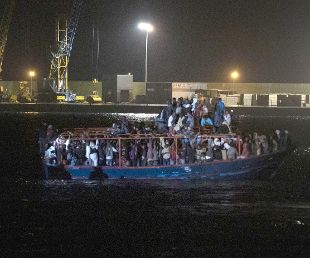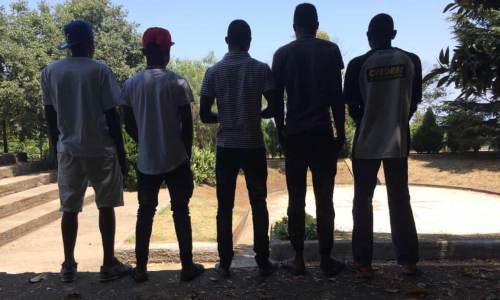The Most Recent Arrivals By Sea and the Strange Power of Racist Propaganda
Weeks of intense movement within the Mediterranean Sea, especially between the nights of 23 and 24 November, when 68 people landed on the coasts of Agrigento, another 79 on the coasts of Crotone and 260 people at Pozzallo. As has already been emphasised several times, this yearìs landings have been characterised by unusual techniques, and have been hardly documented by the media.
 In Agrigento, the small rubber boat on which the migrants were packed was trawled by a so-called “mothership” which, once in the Search And Rescue zone, left the smaller vessel to its fate, waiting for rescue by the Italian authorities. Six suspected boat drivers were arrested, even if it needs to be ascertained why these six would remain on the rubber boat rather than return to Libya with the trawler.
In Agrigento, the small rubber boat on which the migrants were packed was trawled by a so-called “mothership” which, once in the Search And Rescue zone, left the smaller vessel to its fate, waiting for rescue by the Italian authorities. Six suspected boat drivers were arrested, even if it needs to be ascertained why these six would remain on the rubber boat rather than return to Libya with the trawler.
The same technique was used off the coast of Crotone, where the police – the Guardia di Finanza – after rescuing the rubber boat caught near Capo Cimiti, found a line that had probably been used by the crew to attach the rubber boat containing the migrants. In this case, two Lithuanians were stopped near to the police station in the town, raising suspicion through being soaked threw and covered in sand.
The Hotspot at Pozzallo was the destination for 182 men, 40 women and 42 minosr. The psychologists from MEDU* publicised on Facebook that four people had been recovered in hospital, including one in a coma. The association emphasised the lack of sufficient cultural mediators – only one was present for the 260 people – and the lack of adequate psychological support. According to our sources, there were seven arrests, two of whom have probably already been released, given that the media reports only five people arrested.
In total, 400 people landed in the arc of only two days, showing that – without a shadow of a doubt – it is still possible, and that Salvini’s rhetoric of closed ports is now more than a hashtag designed for electoral propaganda, far more than an actual taking a political and legal position. We recall, in fact, that there has not been any ministerial note nor any article of law that lays down the closure of the ports to migrants – precisely because this would be against the international agreements signed by Italy.
And yet the fall in the number of arrivals in 2018 is very real, around 23,000 people compared with 117,000 last year. The new government is puffing up its chest with this “success” and, through the Minister of the Interior, has issued a statistical report in which it has demonstrated the ‘miracle’ achieved by this government in only 6 months.
Analysing the numbers and the data, the situation seems quite different however. The fall in arrivals is not a consequence of the establishment of the new government and Salvini’s mediatic politics of zero tolerance.
The UNHCR, in its periodic reports has set the ministry’s figures in a much wider context. Thus while it is true that in 2018 there has been a fall of around 80% in the Italian route, it is also true that other routes have seen a constant and disproportionate increase, such as in Spain, where the number of migrants who have crossed the border in one of the two Spanish enclaves in Morocco or arrived on the Andalusian beaches has seen an increase of 130% – in the first six months of this year. The same is true for Greece, where the increase has been of 88% in comparison with the previous year.
Summing up these numbers one does not, nevertheless, approach the numbers of the previous years – yet it is correct to emphasise how there has been a change in direction and routes in relation to Middle Eastern and North African migrations.
Another important fact is the moment in which this fall in the numbers on the Italian route began to manifest. The UNHCR report shows how the real drop came in July and September of 2017 and indeed, with the establishment of the new government, the numbers have actually increased slightly in respect to the constant drop in the months prior to the elections.
Furthermore, if we compare these figures with the number of interceptions and interventions by the Libyan Coast Guard one can note how the lowering in the number of arrivals to Italy correlates to a significant increase in Libyan interventions, starting at 38% in August 2017 – representing a moment of the least arrivals – up to 74% in July 2018.
Putting this increase in the migrational flow across the other Mediterranean routes together with the number of interventions by the Libyan Coast Guard, one can see that the decrease in the number of arrivals is not entirely due to the entrance of Conte and Salvini to Palazzo Chigi, but rather to the deals with Libya established by the prior Minister of the Interior, Minniti.
Salvini is of course quite aware of all this. Indeed, her has never denied a certain sympathy for the ex-Minister of the Democratic Party, and is in perfect continuity with his project. The horrendous violations of human rights perpetrated in the Libyan concentration camps through violence and torture are the result of the deals and economic support Italy has provided following Minniti’s negotiations, the current candidate for leadership of his party.
Salvini, for his own part, has announced that he wants to invest half a billion Euros in African countries with the highest rate of emigration towards Europe, calling his project an ‘Italian Marshall Plan for Africa’. This is the classic rhetoric of ‘help them where they come from’, which while on one hand foresees welcome help for countries in difficult, on the other connects this assistance with a series of agreements that would create more control on those who leave and increase the will for these countries to accept deportations of migrants from Italy. Just like the Marshall Plan itself, the aim is to hold more influence over Africa and establish a dynamic of economic blackmail that might keep the lid ‘securely’ on migration.
In the meantime, in an Italy that is watching an unconstitutional and deeply racist law like the security decree being turned into law (on the basis of government stability), the government’s xenophobic rhetoric is beginning to have real consequences. It might be just a coincidence (though probably it isn’t) that after the public prosecutor for Catania attacked MSF’s ship Aquarius for having disposed of migrant’s infected clothes and not correctly sorted the trash, one of the women who had landed at Pozzallo on November 24th was verbally abused – while she visited her small child who had been admitted to the hospital in Ragusa – by other mothers in the neo-natal unit, scared that she might pass diseases to their own new-borns.
Obviously we are dealing here with ignorance and deliberate confusions of the truth (inacceptable in 2018) that nevertheless, being spread by institutional bodies, finds fertile ground in the civilian population. In this sense, the prosecutor Zuccaro has already lent a hand to the struggle against any kind of humanitarian assistance, just as when he openly slandered the NGOs as having colluded with human traffickers, an investigation than reached a total dead end due to lack of evidence, or when he ordered the seizure of the Open Arms, an order subsequently anulled by the Justice of the Peace for Ragusa, and finally through archiving the investigations into Salvini himself in relation to the events surrounding the Diciotti.
The criminalisation of the NGOs and the rescue ships represents the missing figure in the statistics reported above, because the months-long lack of ships to monitor and rescue in the Mediterranean has disallowed any precise calculation of the number of deaths. In our opinion, the apparent decrease here is not accurate. Given the lack of monitoring, it is not possible to know with any precision how many boats have gone down and how many people have drowned without any witnesses. This is confirmed by the critical reports of Mediterranea, who together with Sea Watch and Open Arms are the only operations capable of providing witness accounts regarding the serious and systematic violations of human rights taking place at sea.
Certainly, there are fewer landings and migrants, but there is an increase in silence about all those lives whose hope for a better future has been swallowed up by the sea,
Peppe Platania
Borderline Sicilia
*MEDU = Doctors for Human Rights
Project “OpenEurope” – Oxfam Italia, Diaconia Valdese, Borderline Sicilia Onlus
Translation by Richard Braude


